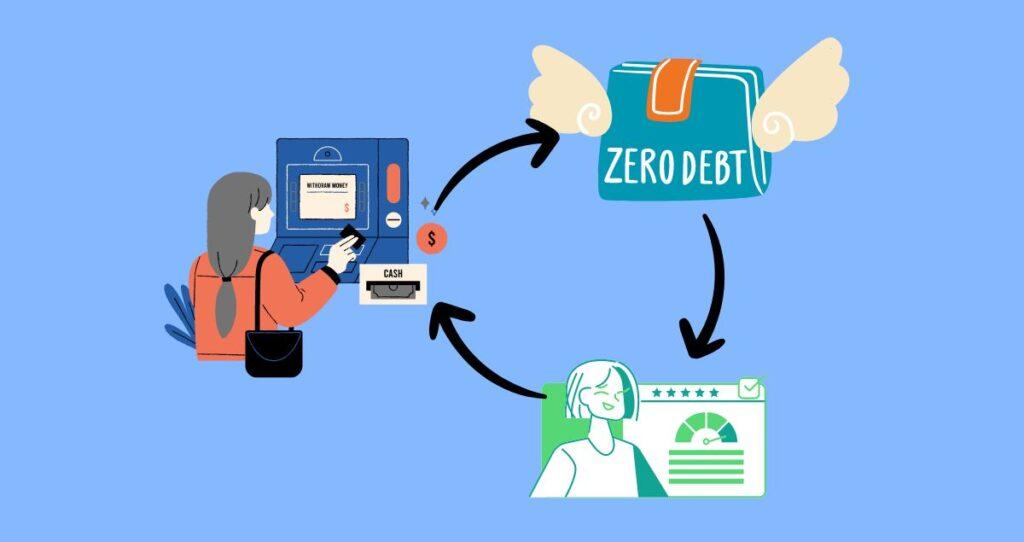When you get denied credit, the best course of action is to evaluate and fix the problems that led to a denial of your credit application. Did you get denied credit due to a lot of credit card balances? If so, start using your credit cards wisely and pay off some of that balance to improve your credit utilization. Did you get denied credit due to having too many debts such as car loans, personal loans, or mortgages? If so, pay off some of those loans to improve your debt-to-income(DTI) ratio.
More reasons to get denied credit
It is also possible that you might be denied credit due to having bad credit. In this case, repairing your credit first will be the best step moving forward. For example, if you get denied a conventional mortgage due to having a bad credit score, you might need to raise your credit score to at least 620 before you can submit another mortgage application. If you are new to credit and have a thin credit file, take a step back and build your credit history. You can easily start with starter credit cards, secured credit cards, or become an authorized user of a credit card account. This technique will allow you to build a credit history and later qualify for normal loans.
Were you denied credit due to wrong information on your credit reports? if so, review your credit reports and dispute any errors, fraudulent activities, or inconsistencies in them. You can also have removable negative items deleted from your credit reports to boost your credit score.
Being denied credit by one lender does not mean you cannot qualify for credit. If you have most of the requirements for getting credit, try a different lender. Some lenders might agree to give you credit for a little higher interest rate and stricter terms. Although paying a higher interest or having stricter terms is not a good financial idea; to some people, this could be a viable option.
This article will walk you through things you should do when you get denied credit.
1. Examine why you have been denied credit
There are a ton of reasons why your lender can deny your credit application. For example, if your credit utilization is on the roof due to maxing out your existing credit cards, most credit card issuers will not approve you for more credit card accounts. Common reasons for credit application denial are tied to your credit history, credit score, current debts, your payment behavior, and your income. These elements that affect your approval or denial rate are explained below in more detail.
You have a bad credit score
Most lenders will not lend you money when you have a bad credit score. The score you need will depend on the type of credit you are applying for. For example, for a conventional mortgage, you need a minimum credit score of 620. But, this does not mean you cannot qualify for other forms of mortgages. Some mortgages such as VA and USDA loans might not require a credit score or require a much lower credit score to qualify for the loan. So, if you were denied a loan due to a bad credit score, start rebuilding your credit and reapply once your score is good. You can also apply for loans that require a much lower credit score.
The following tips can help you boost your credit score and increase the odds of qualifying for credit the next time you apply.
- 13 tips on how to build credit fast and improve credit score
- How to Raise Your Credit Score in 30 Days?
Your income is not good enough
Did you get denied credit because your income is low or you have not been working in the last 2 years? In this case, what you have to do is to continue working to get the work history and income requirements before you can apply again. To improve your income, get a second job, start a side hustle, or simply improve your skills and get paid more on your current job. To improve your work history, just keep working.
You don’t necessarily have to work on the same job for 2 years. Most lenders check whether you worked continuously over the last two years or not. In case you just lost your job, lenders will not approve you for credit until you have secured another job. So, what you have to do is to find another job and show your lender an off letter to get the loan you need.
Related: 9 ways to increase your income
You have a higher DTI ratio
The debt-to-income(DTI) ratio is the ratio of your current monthly debt payments to your monthly gross income. A higher ratio shows that you have too much debt already compared to your income. As a result, you cannot afford to take on more loans when you have a higher DTI ratio. Most lenders suggest that you keep your DTI ratio under 28%. But this does not mean you cannot get approved for credit when you have a DTI ratio in the 30s and 40s.
If you have been denied credit due to a higher DTI ratio, pay off some of your debts and improve your DTI ratio. Getting denied a loan is frustrating. But, it is always important to reflect back and see the benefits in every decision. If your lender gave you money, you might be happy for the short term. But, the consequences of borrowing more money than you can afford to pay off are immense for you and the lender. That is borrowing more than you can afford to pay off leads to defaults, foreclosures, bankruptcies, collections, etc.
None of these financial events is good for either one of you(you and your lender). That is why you need to pay off some of your debts and improve your DTI ratio before you can apply again.
You have recent derogatory marks on your reports
Even if you might have an OK credit score, you can still be denied credit due to negative items on your credit reports. For example, some lenders will deny you credit when you have a bankruptcy or foreclosure on your reports.
A quick solution is to find a different lender who might be willing to bypass these negative items. In case you keep getting denied for credit due to derogatory marks, focus your attention on rebuilding your credit. After a few years, these negative items will have less impact on your credit score.
There are inconsistencies in the information reported in your credit reports
There are times when wrong information such as errors, inaccuracies, and fraudulent activities will be reported on your credit reports. The solution to these issues is to have them fixed by disputing them with either credit reporting bureaus, lenders, or both. No lender will approve you for a loan when what you say is inconsistent with what was reported on your reports. Overdue negative items such as hard inquiries that are over 24 months can also be deleted from your reports. This will help you improve your credit and bring your account to its current status.
Refer to the following resources to check and clean up your credit reports.
- How to get a free annual credit report?
- How to dispute an error on your credit report?
- How to Clean up your credit report fast?
2. Check your credit reports
Before you even apply for credit, it is a good idea to check your credit reports. In case you get denied a loan due to inconsistencies in your credit reports, you must fix these issues first. You don’t need to pay to get a copy of your credit reports. This is because each one of the three major credit reporting agencies(Equifax, TransUnion, Experian) is required to give you a free copy of your credit report once in 12 months. To get a free copy of your credit reports, get it from the free annual credit reports website. This is the only government-approved website to offer free credit reports.
The reason you need to check your credit reports is to make sure that all information reported on your reports reflects your current financial status. That is your name, address, current debts, payment history, and related information are all correct. In case you find errors, inaccuracies, or fraudulent activities, dispute them. Cleaning up your credit reports is essential to avoid unnecessary delays in your credit application processes.
3. Improve your credit
Lenders prefer borrowers who pose fewer risks. For this reason, your credit history and credit score are some of the most important factors in determining your credit approval and the interest rate you pay. The higher your credit score, the lower your interest rate will be. The opposite is also true. Borrowers with lower credit scores tend to get into financial trouble easily and default on their loans very often. For this reason, a lower credit score results in the denial of your credit application or paying a higher interest rate due to the higher risk you pose as a borrower.
What should you do when you get denied credit due to bad credit? Take some time to rebuild your credit before you submit another credit application. For example, if you have credit cards and existing loans, make your payments on time. Also, lower your credit utilization, especially on your credit cards and revolving credit accounts.
You might also need to start with credit builder loans, secured credit cards, or simply become an unauthorized user of another credit card account. These accounts will help you repair your credit fast and get up to speed.
4. Pay down some of your debts to improve your DTI ratio
Earlier, I slightly mentioned that having a higher DTI ratio might get you denied credit. Since a higher DTI ratio indicates that you have too much debt already, pay off some of your debts first when you get denied credit. All debt payments will lower your ratio and improve your chance of qualifying for credit next time.
To effectively pay off your debts, use the following guides.
- How to use the debt avalanche method to pay off debt?
- 6 effective ways to pay off revolving debt fast
- How to use the debt snowball method to pay off debt?
- 6 effective ways to pay off credit card debt
5. Apply for credit after fixing the problem
After fixing the problem, re-apply for credit. For example, if the only reason you were denied credit was due to having a bad credit score, you can raise your score and reapply. Also, use this opportunity to re-evaluate your credit standing and make sure that nothing is left to chance.
How does applying for credit affect your credit score?
When you apply for credit, the lender request to see your credit file. This results in a hard inquiry on your credit reports. Each hard inquiry will lower your credit score between 5-10 points. In addition, hard inquiries stay on your credit reports for 24 months. Depending on the type of credit you applied for, your credit limit could go higher. An increase in credit limit might lower your credit utilization and improve your credit score.
A new credit account might also improve your credit mix which is good for your credit over the long run. Keep in mind that a new credit account might reduce the age of your credit. A reduction in the age of your credit might knock off a few points from your credit score.









